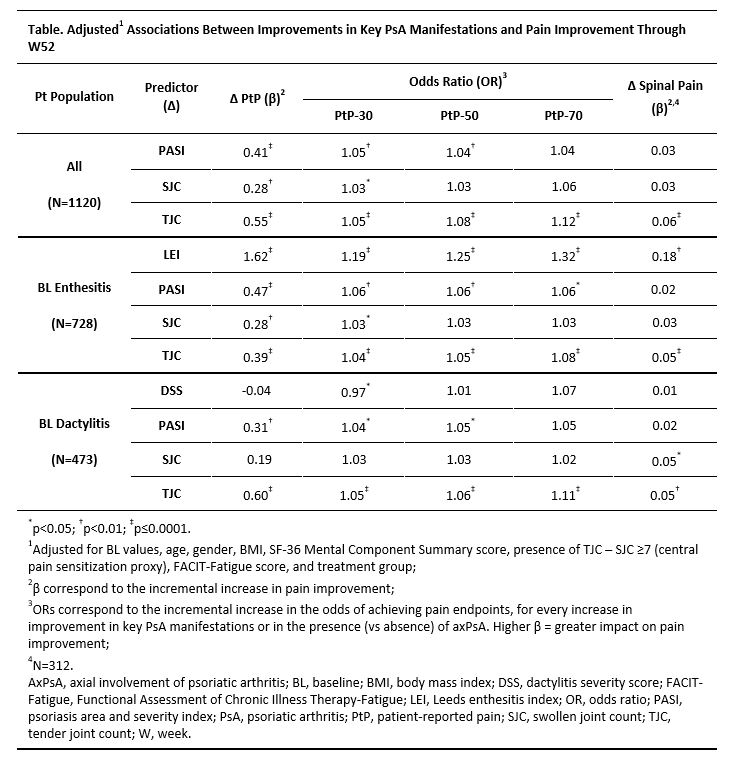Session Information
Date: Monday, November 13, 2023
Title: (1412–1441) Spondyloarthritis Including Psoriatic Arthritis – Treatment Poster II: SpA
Session Type: Poster Session B
Session Time: 9:00AM-11:00AM
Background/Purpose: Pain in PsA has multifaceted origins (e.g., peripheral joint inflammation, axial involvement [axPsA], skin lesions, dactylitis, enthesitis, underlying conditions) and can be difficult to treat. Guselkumab (GUS), a fully human IL-23p19 subunit inhibitor, is effective in treating multiple PsA domains and elicited durable improvement in patient-reported pain (PtP) in the DISCOVER-1&2 trials1,2. Here, we assessed association between improvement in key PsA manifestations and PtP using 1-year DISCOVER-1&2 data.
Methods: DISCOVER-1&2 enrolled adults with active PsA despite standard therapies3,4. Patients were randomized 1:1:1 to GUS 100 mg every 4 weeks (Q4W); GUS 100 mg at W0, W4, then Q8W; or placebo with crossover to GUS 100 mg Q4W at W24. Treatment groups were pooled (N=1120). Longitudinal associations of improvement in swollen joint count (SJC,0-66), tender joint count (TJC, 0-68), Leeds enthesitis index (LEI), dactylitis severity score, Psoriasis Area and Severity Index (PASI), axPsA (N=312), and improvement in overall PtP (0-100 mm) and spinal pain (BASDAI question 2 in patients with axPsA) were assessed. Longitudinal associations of improvement in these PsA manifestations with ≥30%/50%/70% improvements in PtP (PtP-30/50/70) were assessed.
Results: Mean (SD) baseline PtP of 61.2 (19.8) indicated substantial burden. Upon adjusting for potential confounders, greater improvement in PASI, SJC, and TJC (mutually adjusted) were each associated with significantly greater improvement in PtP and higher odds of achieving PtP-30 through W52 (Table). PASI reduction was also associated with greater odds of PtP-50, as was TJC improvement for PtP-50/70. In patients with baseline enthesitis, improvements in LEI, PASI, and TJC were each associated with greater PtP improvement and attaining PtP-30/50/70; SJC reduction was only associated with PtP-30. In patients with baseline dactylitis, PASI and TJC reductions were significantly associated with PtP improvement. Overall, axPsA presence did not impact the extent of PtP improvement (data not shown). In patients with axPsA, significant associations were observed between spinal pain improvement and TJC and LEI improvement.
Conclusion: Improvements in key PsA manifestations were significantly associated with pain reduction, although to varying extents. TJC reduction had the greatest impact on PtP improvement, likely due to overlap of the construct measured. Psoriasis improvement had a greater impact on pain relief than SJC improvement, highlighting the sensory burden of skin lesions, while enthesitis improvement showed a significant association with both overall and spinal pain relief. These findings underscore the importance of utilizing treatments effective across manifestations to address recalcitrant PsA symptoms.
References:
1. Ritchlin CT. RMD Open 2022;8:e002195
2. Nash P. ACR Convergence 2021 (PO1333)
3. Deodhar A. Lancet 2020;395:1115
4. Mease PJ. Lancet 2020;395:1126
To cite this abstract in AMA style:
Nash P, McInnes I, T. Ritchlin C, Tam L, Soriano E, Starr M, Rampakakis E, Lavie F, Shawi M, Baraliakos X, Mease P. Impact of Psoriatic Arthritis Manifestations on Perception of Pain Improvement: Pooled Analysis of Two Phase 3, Randomized, Double-Blind, Placebo-Controlled Studies with Guselkumab [abstract]. Arthritis Rheumatol. 2023; 75 (suppl 9). https://acrabstracts.org/abstract/impact-of-psoriatic-arthritis-manifestations-on-perception-of-pain-improvement-pooled-analysis-of-two-phase-3-randomized-double-blind-placebo-controlled-studies-with-guselkumab/. Accessed .« Back to ACR Convergence 2023
ACR Meeting Abstracts - https://acrabstracts.org/abstract/impact-of-psoriatic-arthritis-manifestations-on-perception-of-pain-improvement-pooled-analysis-of-two-phase-3-randomized-double-blind-placebo-controlled-studies-with-guselkumab/

